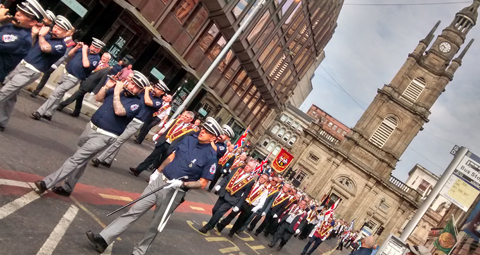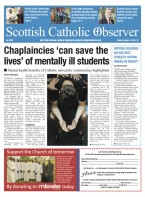BY Daniel Harkins | July 13 2018 | ![]() 0 COMMENTS
0 COMMENTS ![]() print
print

Call attack for what it is: anti-Catholic hate crime
Publication Date: 2018-07-13
Archbishop to meet government over attack on priest during Orange walk
The Catholic Church is to meet the justice secretary after a priest in Glasgow was attacked during an Orange walk, and will call on the Scottish Government to prevent anti-Catholic hate crime from being ‘swept under the carpet and simply labelled as sectarian.’
Archbishop Philip Tartaglia of Glasgow and Anthony Horan, director of the Scottish Catholic Parliamentary Office, have accepted an invitation to meet the cabinet secretary for justice later this month to discuss the incident at St Alphonsus’ Church in the East End, which has been condemned by politicians from all parties and resulted in more than 60,000 people signing a petition for Orange walks to be banned.
However, the Church—which has previously referred to the word ‘sectarianism’ as a euphemism—said the Scottish Government ‘must not be afraid of confronting the truth.’
The statement, from Mr Horan, praised the First Minister Nicola Sturgeon and other politicians for condemning the attack, however it added: “We now need leadership and that leadership should come from government in the form of a strong message that anti-Catholic behaviour will no longer be tolerated and that government will do everything in its power to stop it.”
Canon Tom White, parish priest St Alphonsus’ and St Mary’s in the Calton, said he was twice spat on and attacked by a man carrying a pole as parishioners left Mass at the same time as a passing Orange march on July 7.
He added that he was subjected to sickening verbal abuse and called a ‘Fenian’ and a ‘paedophile.’
Another Orange walk is set to pass the church on July 21, and Canon White said he hopes ‘fresh consideration is given to policing the parade.’
Mr Horan and Archbishop Tartaglia will meet with the government at an unconfirmed date this month.
A Church spokesman said: “This is a welcome opportunity to discuss the issue of safety and the right of Catholics to be protected from violence, aggression and intimidation during the so-called marching season and also wider issues of anti-Catholic hate crime which continues to dominate religiously aggravated offending in Scotland.”
Statistics
Government statistics released last month show that half of all victims of religious hate crime in Scotland are Catholic, despite Catholics making up less than 15 per cent of the Scottish population.
Police Scotland said they are looking to identify those involved in the attack and are trying to trace a man aged between 20 and 30 with a shaved head.
After being criticised for originally referring to the attack as a ‘minor incident,’ Police Scotland said they wished to ‘assure everyone that those who choose to react in a sectarian or religiously motivated manner will be identified and dealt with under the law.’
However, use of the word ‘sectarian’ in public statements by authorities and politicians has been criticised by Mr Horan, who said it is important to recognise anti-Catholic hate crime for ‘what it is and not try to wrap it up as something it is not.’
Anthony Horan said: “The kind of behaviour witnessed at St Alphonsus’ on Saturday night is often labelled ‘sectarian.’ But it should be labelled ‘anti-Catholic.’
“We have reached a critical point for the Catholic community in Scotland. We now need leadership and that leadership should come from government in the form of a strong message that anti-Catholic behaviour will no longer be tolerated.”
In the aftermath of the attack, Labour MSP Monica Lennon drew attention on Twitter to hate crime figures.
She said it was important to address that the incident was anti-Catholic.
“It happened to a Catholic priest outside a Catholic Church where people were coming to worship—there’s no getting away from that,” she said.
She also called for the police to be more sensitive in their response following criticism of their initial description of the attack as ‘minor,’ and for more diversity in the police force and more funding for community projects.
She added: “From a public safety view and from the view of respecting religion I don’t think having these marches in the vicinity of a Catholic church is acceptable and I think most people would agree.”
Glasgow City Council has been criticised for allowing the Orange walks to occur and to walk past a Catholic church, however in a statement the council maintained that its powers are limited as it has to work within national legislation.
It said local authorities do not have the power to block the conduct of a public procession, that it is not permitted to take into account the number of parades undertaken by any particular organisation or the cumulative impact of these, and that each procession notification is required to be considered on its own individual merits.
“A meeting with council officers will be held this week as it’s perhaps time to review our procedures in light of a number of factors,” a spokesperson for the council said. “Our aim is always to strike a reasonable balance between protecting the fundamental right of individuals and organisations to organise and participate in public processions, and the need to minimise disruption to the wider community.”
Powers
Asked by the SCO if the Scottish Government would take action to prevent Orange walks going past Catholic churches in future, either by giving local authorities those powers or implementing themselves, a spokesperson said: “Responsibility for the regulation of marches and parades rests with local authorities. Each local authority, in consultation with Police Scotland, is in the best position to decide whether a particular event should go ahead and whether any restrictions should be placed on it.
“The Scottish Government supports local authorities in making decisions which achieve the correct balance between the rights of marchers and the rights of the communities affected.”
Asked what action the government will take to reassure the Catholic community that a repeat of the attacks won’t happen during future parades, the spokespersons said: “The Scottish Government is committed to upholding the human rights of all of our communities and this included the right to hold marches and parades, however, such a right must be balanced with the rights of communities affected by such events to go about their business as undisturbed as possible and without fear for their safety.”
Rumours spread on social media of attacks on other priests and churches over the weekend, including at St Patrick’s in Shotts, however parish priest Fr Thomas Brady said there was no trouble from members of the march and the police sat in the car park throughout the event.
“It was just the usual—plenty of noise and shouts of ‘Fenian,’” he said. “A couple of fellows came into the gardens to go to the toilet, and then ran off into the nettles—it was hilarious watching them dance.”
Complaints
Local councillors in the Calton area have urged those outraged by the attack on Canon White to contact the Glasgow Council Processions Committee directly—as Tweets and Facebook posts are not counted when decisions are made.
The alleged hate crime has resulted in thousands of social media posts condemning the marches, however councillors said it was vital that Catholics make their feelings known through official channels.
SNP councillor Greg Hepburn, a former parishioner of St Alphonsus’, said: “We are trying to encourage as many people as possible to contact the council because that gives us a reference to ensure this doesn’t happen again in future.
“I know that we don’t actually get much comment on this—a lot of people comment on Twitter and Facebook but you’d be surprised how little formal complaint takes place. The more public comment there is and the more people feeding into the process the more helpful it is because it shows the weight of evidence and how annoyed people are.
“Contacting councillors and MSPs is helpful but directly putting in a representation is more helpful because that’s official and recorded—it’s not how many people tweeted but how many put in a correspondence.”
Fellow Calton councillor Jennifer Layden said the council needs to have a long conversation about what will happen in future and she said complaints should be officially made so that they are recorded and logged.
“In the past 24 hours a number of people have contacted me on Twitter or verbally and I’ve asked them to put complaints in,” she said. “It is the best way to deal with that so it is all logged.”
– You can contact the Glasgow City Council Processions Committee at: [email protected]











